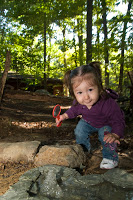Mason District to be designated a ‘community wildlife habitat’
 The National Wildlife Federation plans to certify Fairfax County’s Mason District as a “Community Wildlife Habitat.” The certification will be formally presented at a September meeting of the county Board of Supervisors.
The National Wildlife Federation plans to certify Fairfax County’s Mason District as a “Community Wildlife Habitat.” The certification will be formally presented at a September meeting of the county Board of Supervisors.The Community Wildlife Habitat program is an extension of the NWF’s Certified Wildlife Habitat program, which recognizes people and groups who make their backyards, gardens, or even apartment balconies attractive for wildlife.
To be certified, you need to use sustainable gardening practices and provide:
- at least three different food sources—such as trees and shrubs that produce berries, nuts, or seeds;
- a water source—like a pond, rain garden, or bird bath;
- at least two places where wildlife can find protection from the weather and predators—a wooded area, bramble patch, rock pile, or roosting box, for example; and
- at least two places for wildlife to raise their young—such as mature trees, a nesting box, wetlands, cave, or thicket.
To achieve a Community Wildlife Habitat designation, a community with a population between 100,001 and 300,000 has to have 300 backyard habitats plus three common areas, such as businesses or parks, and five schools certified as wildlife habitats. The Mason District exceeded those requirement by securing habitat designation 11 businesses or parks and 13 schools, as well as 300 homes.
 Mason District’s population of 250,000 makes it the fourth largest certified community habitat in the nation. The Greater Mason District Community Wildlife Habitat will be the 44th communitywide habitat in the country and the sixth in Virginia. There are over 134,000 certified habitats nationwide, 6,616 in Virginia, and 1,665 in Fairfax County.
Mason District’s population of 250,000 makes it the fourth largest certified community habitat in the nation. The Greater Mason District Community Wildlife Habitat will be the 44th communitywide habitat in the country and the sixth in Virginia. There are over 134,000 certified habitats nationwide, 6,616 in Virginia, and 1,665 in Fairfax County.
The Mason District effort to pursue certification began in 2005, when Supervisor Penny Gross; Park Authority Board Member Frank Vajda; the Hidden Oaks Nature Center; the Friends of Hidden Oaks; and representatives from Earth Force, the Northern Virginia Conservation Trust, and Home Depot formed the Greater Mason District Community Habitat team. Gross, Vajda, and Holland are part of the current team, along with Hidden Oaks Manager Michael McDonnell and Friends of Hidden Oaks President Scott Birdwell and Vice President Kevin Holland.
During the past few years, dozens of programs and presentations for Mason District residents—targeting everyone from schoolchildren to retired homeowners—were conducted on “how to create and restore natural landscapes and provide a wildlife-friendly backyard or balcony,” says Hidden Oaks Assistant Manager Suzanne Holland.
“Enthusiastic homeowners and community groups adopted a philosophy that connects people to their natural environment, by individually and communally creating spaces that provide food, water, shelter, and a place to raise young,” Holland says. “Team leaders promoted the advantages of native plants over exotics and even over bird feeders.” And it’s not just the wildlife that benefits. “The recommendation to use organic alternatives to pesticides also creates a landscape friendlier to people,” she adds.

